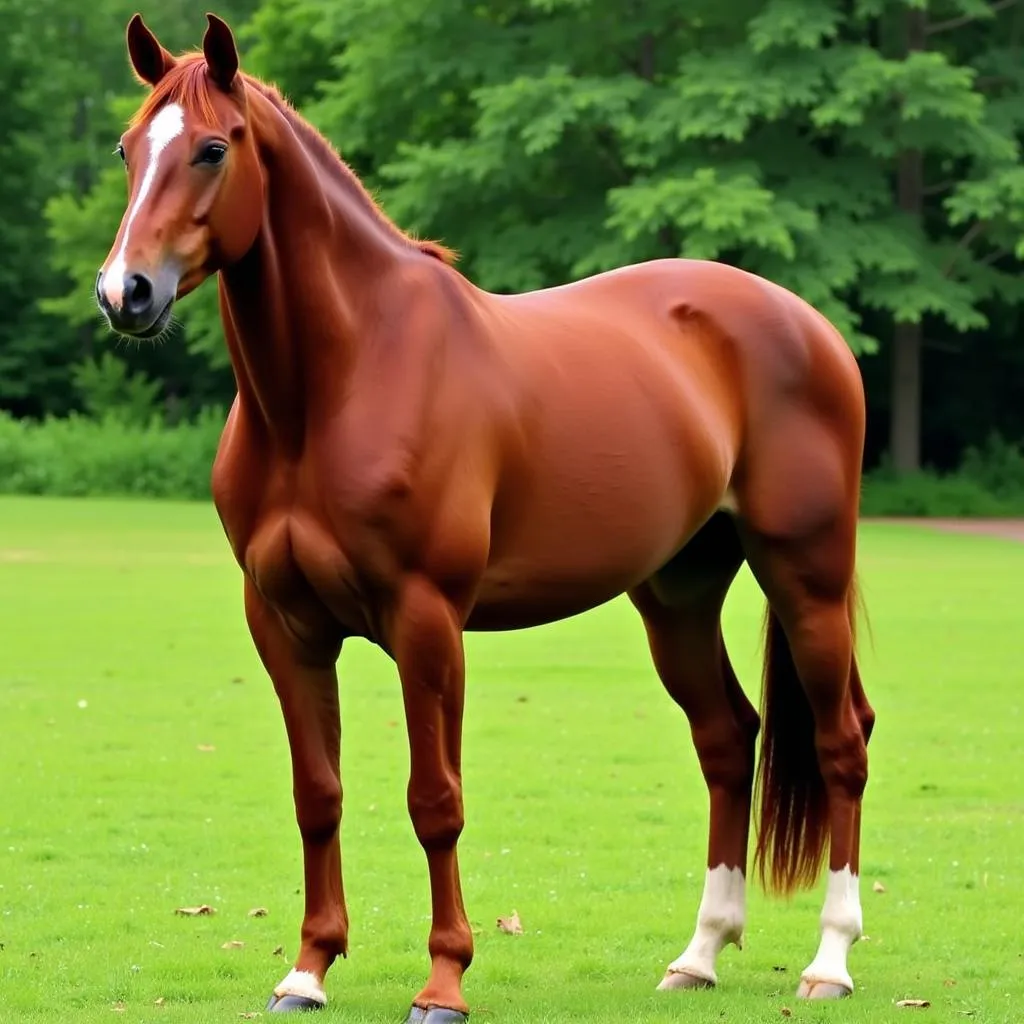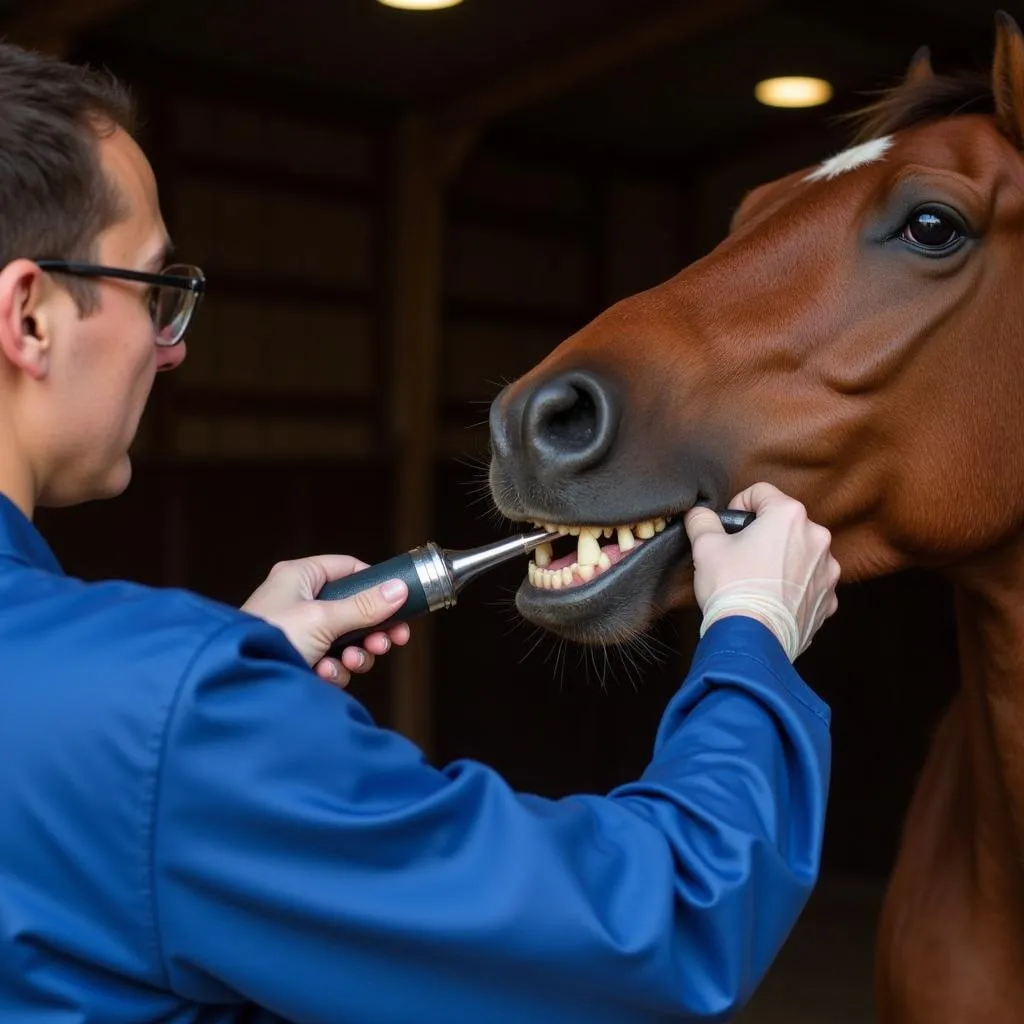The Average Weight Of A Quarter Horse is a question that often arises amongst horse enthusiasts. While there’s no one-size-fits-all answer, understanding the breed standard and influencing factors can give you a clearer picture. Generally, a mature Quarter Horse weighs between 950 and 1,250 pounds. However, this range can fluctuate based on various elements such as genetics, gender, age, diet, and overall care.
 Quarter Horse standing in a field
Quarter Horse standing in a field
Factors Influencing Quarter Horse Weight
Several factors contribute to a Quarter Horse’s weight, going beyond the breed’s general standard. Let’s delve into some of the most significant:
1. Genetics and Bloodlines
Just like in humans, genetics play a crucial role in a Quarter Horse’s build and weight. Specific bloodlines within the breed are known for producing heavier or leaner horses. For example, lines bred for halter classes tend to be stockier and heavier than those bred for racing.
2. Gender
As a general rule, male Quarter Horses (stallions and geldings) are typically larger and heavier than females (mares). This difference is primarily attributed to hormonal variations and overall skeletal structure.
3. Age
A Quarter Horse’s weight fluctuates throughout its life. Foals are born relatively small but grow rapidly during their first year. They typically reach their full adult weight between 4 to 6 years old.
 Quarter Horse mare and foal in the stable
Quarter Horse mare and foal in the stable
4. Diet and Nutrition
A balanced and nutritious diet is vital for a Quarter Horse’s overall health and weight management. High-quality hay, pasture grass, and concentrated feed, along with essential vitamins and minerals, are crucial for maintaining an ideal weight.
5. Exercise and Activity Level
A Quarter Horse’s activity level directly impacts its weight. Horses used for strenuous activities, such as ranch work or performance events, tend to have leaner builds compared to those with less demanding workloads.
6. Overall Health Condition
Underlying health issues can affect a Quarter Horse’s weight. Parasites, dental problems, or chronic diseases can lead to weight loss or difficulty maintaining a healthy weight.
Importance of Maintaining a Healthy Weight
Maintaining a healthy weight is crucial for a Quarter Horse’s well-being and longevity. Both obesity and being underweight can lead to various health concerns, including:
- Obesity: Increased risk of laminitis, joint problems, and metabolic disorders.
- Underweight: Weakened immune system, reduced performance, and difficulty maintaining body temperature.
Consulting with a Veterinarian
It’s always best to consult with a qualified equine veterinarian to determine the ideal weight range for your Quarter Horse. They can assess your horse’s individual needs based on their age, gender, activity level, and overall health.
 Veterinarian examining a Quarter Horse's teeth
Veterinarian examining a Quarter Horse's teeth
Conclusion
While the average weight of a Quarter Horse falls between 950 and 1,250 pounds, numerous factors can influence this range. Understanding these factors and prioritizing your horse’s health are essential for maintaining their ideal weight and ensuring a long and happy life.
Remember, if you have any concerns about your Quarter Horse’s weight, consult with your veterinarian to create a tailored plan that meets their individual needs.
FAQ
1. What is considered overweight for a Quarter Horse?
A Body Condition Score (BCS) of 6 or higher on a 9-point scale is generally considered overweight for a Quarter Horse. This can be determined by visually assessing the amount of fat cover over the ribs, neck, withers, and behind the shoulder.
2. How can I help my overweight Quarter Horse lose weight?
Consult with your vet to develop a safe weight-loss plan, which may include dietary adjustments, increased exercise, and addressing any underlying health conditions.
3. Is it normal for a Quarter Horse’s weight to fluctuate?
Yes, slight weight fluctuations are normal, especially depending on the season, activity level, and changes in diet. However, drastic or unexplained weight changes should always be investigated by a veterinarian.
4. How much should I feed my Quarter Horse to maintain a healthy weight?
The amount of feed required varies depending on several factors, including age, activity level, metabolism, and the quality of forage available. Consult your vet or an equine nutritionist for personalized recommendations.
5. Can you recommend any resources for learning more about Quarter Horse care?
For more information on caring for your Quarter Horse, check out our article on how much does a 2 horse trailer weight, which discusses the importance of choosing the right trailer for transportation based on weight considerations. We also have a helpful resource on 2 horse weekender trailer options, providing insights into suitable trailer designs for short trips and weekend getaways with your equine companion.
Need more help? Contact us at Phone Number: 0772127271, Email: [email protected] Or visit us at: QGM2+WX2, Vị Trung, Vị Thuỷ, Hậu Giang, Việt Nam. Our customer service team is available 24/7.